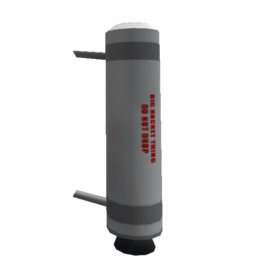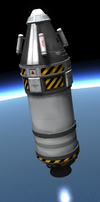Difference between revisions of "Sepratron I"
From Kerbal Space Program Wiki
m (added other use for sepratron) |
m |
||
| Line 12: | Line 12: | ||
*[[w:JATO|Rocket-assisted take-off]] by mounting Sepratrons on the body of a plane; | *[[w:JATO|Rocket-assisted take-off]] by mounting Sepratrons on the body of a plane; | ||
*Stage detachment: Placed on a spent stage and angled correctly, activating Sepratrons during the detachment of the spent stage can drive the debris away from the rocket; | *Stage detachment: Placed on a spent stage and angled correctly, activating Sepratrons during the detachment of the spent stage can drive the debris away from the rocket; | ||
| − | *Test launches of lightweight vehicles; note that Sepratrons can quickly overheat adjacent parts | + | *Test launches of lightweight vehicles (explanation needed); note that Sepratrons can quickly overheat adjacent parts |
*Emergency escape engines; attached to a capsule or other important part and bound to the "Abort" [[action group]], Sepratrons allow said parts to quickly and easily escape from exploding rockets and other emergencies. | *Emergency escape engines; attached to a capsule or other important part and bound to the "Abort" [[action group]], Sepratrons allow said parts to quickly and easily escape from exploding rockets and other emergencies. | ||
*Used as a way to substitute for thrust loss. Separating a stage and setting them off when decoupling can be used to maintain constant thrust. | *Used as a way to substitute for thrust loss. Separating a stage and setting them off when decoupling can be used to maintain constant thrust. | ||
Revision as of 21:36, 16 April 2014
| Sepratron I | ||
| Solid rocket booster by Periapsis Rocket Supplies Co | ||
| Radial size | Radial mounted | |
| Cost | (total) | 75.00 |
| (dry) | 70.20 | |
| Mass | (total) | 0.073 t |
| (dry) | 0.013 t | |
| Drag | 0.2-0.3 | |
| Max. Temp. | 2000 K | |
| Impact Tolerance | 7 m/s | |
| Research | | |
| Unlock cost | 1 100 | |
| Since version | 0.17 | |
| Part configuration | solidBoosterSep.cfg | |
| Maximum thrust | (1 atm) | 13.79 kN |
| (vacuum) | 18.00 kN | |
| Isp | (1 atm) | 118 s |
| (vacuum) | 154 s | |
| Fuel consumption | 1.59 | |
| Thrust vectoring | No | |
| Burn time | (1 atm) | 3.9 s |
| (vacuum) | 5 s | |
| Testing Environments | ||
| On the surface | No | |
| In the ocean | No | |
| On the launchpad | Yes | |
| In the atmosphere | Yes | |
| Sub-orbital | Yes | |
| In an orbit | Yes | |
| On an escape | No | |
| Docked | No | |
| Test by staging | Yes | |
| Manually testable | Yes | |
| Packed volume | 25 l | |
| Stacking capacity | 2 units | |
| Solid fuel | 8 | |
The Sepratron I is a very tiny solid rocket booster.
Usage
Unlike traditional SRBs, the Sepratron provides too little thrust to be useful during most takeoffs. Instead it offers two great advantages over other boosters: Its small size allows the Sepratron to be placed on almost any surface, while its low weight generally eliminates the need to detach them after burn-out. Red block letters on its casing read "BIG ROCKET THING. DO NOT DROP".
Possible uses include:
- Rocket-assisted take-off by mounting Sepratrons on the body of a plane;
- Stage detachment: Placed on a spent stage and angled correctly, activating Sepratrons during the detachment of the spent stage can drive the debris away from the rocket;
- Test launches of lightweight vehicles (explanation needed); note that Sepratrons can quickly overheat adjacent parts
- Emergency escape engines; attached to a capsule or other important part and bound to the "Abort" action group, Sepratrons allow said parts to quickly and easily escape from exploding rockets and other emergencies.
- Used as a way to substitute for thrust loss. Separating a stage and setting them off when decoupling can be used to maintain constant thrust.
- Used as a way to deorbit small, unused probes on a low orbit.
Description
| “ | Although formerly designated as "really pretty crappy", Kerbal Scientists have slowly warmed up to the Sepratron I's many uses, such as separating things. For best results, angle before use. — Periapsis Co. Rocket Supplies |
” |
Changes
- Mass decreased from 0.2175t Full, 0.15t Empty to 0.0725t Full, 0.0125t Empty. Thrust decreased from 20 kN to 18 kN. Fuel capacity reduced from 9L to 8L. The Sepratron I now has the best TWR of all stock engines.
- Initial release.

